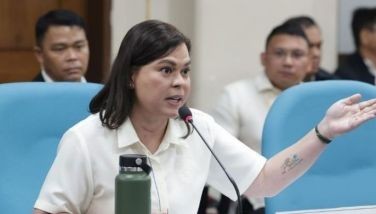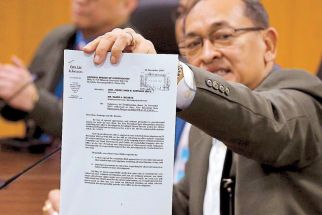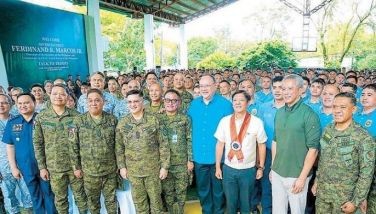RAM leader: We’re through with coups
January 12, 2002 | 12:00am
They’re not plotting a coup, and will in fact be the first to thwart any attempt to launch one.
This assurance was given yesterday by retired Commodore Domingo Calajate, chairman of the executive committee of the Rebolusyonaryong Alyansang Makabansa (RAM).
Calajate, who participated in several attempts to topple the Aquino administration, admitted that RAM’s record in military adventurism makes it difficult for the group to convince people that it was not plotting to oust President Arroyo.
But for whatever it’s worth, he told The STAR yesterday, "We will not take up arms anymore. As far as I am concerned, there will be no coup. We will be the first to counter such coups."
He pointed out that launching a coup d’etat is no easy task. "When (soldiers) cross that line, we risk our careers, our lives. You have to be assured of success."
And he admits that all their coup attempts failed.
The situation in the country today makes it even more difficult for a putsch to succeed, Calajate pointed out.
"Who are we going to die for?" he asked. "There’s no leader in the military."
RAM started out as the Reform the Armed Forces Movement, a loose grouping of soldiers seeking reforms in the military during the Marcos regime. The group came out in public in 1985, unfurling a streamer during a public affair at the Philippine Military Academy (PMA) in Baguio City.
The group’s perceived leader was the charismatic Gregorio Honasan, at the time a lieutenant colonel in the Army who headed the security detail of then Defense Minister Juan Ponce Enrile. Honasan was the "baron" of his Class ’71 in the PMA, which also counts Panfilo Lacson among its members.
Class ’71 formed the core of RAM, but Lacson never joined the group. Honasan and his core group actively spread their reformist gospel in the military and police in the final months of the Marcos regime, recruiting adherents.
In February 1986, Marcos loyalists uncovered a RAM plot to attack Malacañang. Several RAM members in Marcos’ elite Presidential Security Command were arrested and presented to the media.
Enrile, Honasan and their men holed up at Camp Aguinaldo to avoid arrest. They later convinced Fidel Ramos, at the time the chief of the Philippine Constabulary-Integrated National Police, to join them in breaking away from the Marcos regime. Enrile’s group later joined up with Ramos at Camp Crame across EDSA.
Manila Archbishop Jaime Cardinal Sin summoned the people to surround the two camps to protect Enrile’s group, and people power was born. In four days the Marcoses had flown into exile.
After Corazon Aquino was installed as president, she named Enrile to his old post. In November 1986 Enrile was sacked amid reports of a coup plot code-named God Save the Queen.
Seven coup attempts would be mounted against Aquino in her six years in power, mostly by the RAM, with support from Marcos loyalists. Honasan was arrested but mysteriously escaped from a Navy ship where he was detained.
"We failed again and again," Calajate admitted yesterday. "But look how it damaged the country. A coup may not succeed but it can damage the country."
Looking back, Calajate said the coups were a reaction to corruption in the Aquino administration. RAM members like to tell themselves, he said, that without the coup attempts, the corruption could have been worse.
By 1992, however, the group was ready to talk peace. With Ramos at the nation’s helm, a peace agreement was forged with the RAM. Honasan would later make a successful bid for the Senate in 1995.
"When we returned to the mainstream, we turned our back on coups," Calajate said yesterday. "What we cannot achieve through military means, we achieve through politics."
RAM is now a foundation registered with the Securities and Exchange Commission, counting some 10,000 members nationwide, including civilians. The group backed Honasan’s senatorial bid but had a falling out with him over his support for Joseph Estrada’s presidential bid in 1998. RAM had supported Jose de Venecia, Ramos’ preferred successor.
In May last year, RAM again withheld support for Honasan’s run for the Senate because of his continued support for Estrada. RAM had supported the popular uprising that installed Gloria Macapagal-Arroyo in power.
Honasan has since reconciled with Calajate and the group. Calajate, meanwhile, is now a director of the Philippine Amusement and Gaming Corp.
Calajate admitted that the nation still needs many reforms, but he said these were not enough to mount another coup attempt.
He concedes that the people may not believe his assurances. "We’ll just let events bear us out," he said.
This assurance was given yesterday by retired Commodore Domingo Calajate, chairman of the executive committee of the Rebolusyonaryong Alyansang Makabansa (RAM).
Calajate, who participated in several attempts to topple the Aquino administration, admitted that RAM’s record in military adventurism makes it difficult for the group to convince people that it was not plotting to oust President Arroyo.
But for whatever it’s worth, he told The STAR yesterday, "We will not take up arms anymore. As far as I am concerned, there will be no coup. We will be the first to counter such coups."
He pointed out that launching a coup d’etat is no easy task. "When (soldiers) cross that line, we risk our careers, our lives. You have to be assured of success."
And he admits that all their coup attempts failed.
The situation in the country today makes it even more difficult for a putsch to succeed, Calajate pointed out.
"Who are we going to die for?" he asked. "There’s no leader in the military."
RAM started out as the Reform the Armed Forces Movement, a loose grouping of soldiers seeking reforms in the military during the Marcos regime. The group came out in public in 1985, unfurling a streamer during a public affair at the Philippine Military Academy (PMA) in Baguio City.
The group’s perceived leader was the charismatic Gregorio Honasan, at the time a lieutenant colonel in the Army who headed the security detail of then Defense Minister Juan Ponce Enrile. Honasan was the "baron" of his Class ’71 in the PMA, which also counts Panfilo Lacson among its members.
Class ’71 formed the core of RAM, but Lacson never joined the group. Honasan and his core group actively spread their reformist gospel in the military and police in the final months of the Marcos regime, recruiting adherents.
In February 1986, Marcos loyalists uncovered a RAM plot to attack Malacañang. Several RAM members in Marcos’ elite Presidential Security Command were arrested and presented to the media.
Enrile, Honasan and their men holed up at Camp Aguinaldo to avoid arrest. They later convinced Fidel Ramos, at the time the chief of the Philippine Constabulary-Integrated National Police, to join them in breaking away from the Marcos regime. Enrile’s group later joined up with Ramos at Camp Crame across EDSA.
Manila Archbishop Jaime Cardinal Sin summoned the people to surround the two camps to protect Enrile’s group, and people power was born. In four days the Marcoses had flown into exile.
After Corazon Aquino was installed as president, she named Enrile to his old post. In November 1986 Enrile was sacked amid reports of a coup plot code-named God Save the Queen.
Seven coup attempts would be mounted against Aquino in her six years in power, mostly by the RAM, with support from Marcos loyalists. Honasan was arrested but mysteriously escaped from a Navy ship where he was detained.
Looking back, Calajate said the coups were a reaction to corruption in the Aquino administration. RAM members like to tell themselves, he said, that without the coup attempts, the corruption could have been worse.
By 1992, however, the group was ready to talk peace. With Ramos at the nation’s helm, a peace agreement was forged with the RAM. Honasan would later make a successful bid for the Senate in 1995.
"When we returned to the mainstream, we turned our back on coups," Calajate said yesterday. "What we cannot achieve through military means, we achieve through politics."
RAM is now a foundation registered with the Securities and Exchange Commission, counting some 10,000 members nationwide, including civilians. The group backed Honasan’s senatorial bid but had a falling out with him over his support for Joseph Estrada’s presidential bid in 1998. RAM had supported Jose de Venecia, Ramos’ preferred successor.
In May last year, RAM again withheld support for Honasan’s run for the Senate because of his continued support for Estrada. RAM had supported the popular uprising that installed Gloria Macapagal-Arroyo in power.
Honasan has since reconciled with Calajate and the group. Calajate, meanwhile, is now a director of the Philippine Amusement and Gaming Corp.
Calajate admitted that the nation still needs many reforms, but he said these were not enough to mount another coup attempt.
He concedes that the people may not believe his assurances. "We’ll just let events bear us out," he said.
BrandSpace Articles
<
>
- Latest
- Trending
Trending
Latest
Trending
Latest
Recommended
November 30, 2024 - 12:00am
































